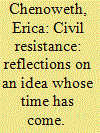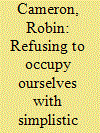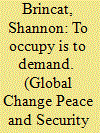|
|
|
Sort Order |
|
|
|
Items / Page
|
|
|
|
|
|
|
| Srl | Item |
| 1 |
ID:
133474


|
|
|
|
|
| Publication |
2014.
|
| Summary/Abstract |
IT HAS BEEN THREE YEARS SINCE WHY CIVIL RESISTANCE WORKS HIT THE shelves.1 When Maria J. Stephan and I sent the final galleys into the publisher, we had no idea that the Arab Spring was about to grip the world; that the Occupy movement would reenergize the protest sector in advanced
democracies; or that countries as diverse as Turkey, Venezuela, Ukraine, Thailand, and India would be rocked by nonviolent resistance against entrenched authority, lack of economic opportunity, and corruption. While many people have cataloged the global decline in armed conflict, few have noticed that, in the meantime, the use of civil resistance has been on the rise.
|
|
|
|
|
|
|
|
|
|
|
|
|
|
|
|
| 2 |
ID:
118021


|
|
|
|
|
| Publication |
2013.
|
| Summary/Abstract |
One of the most important legacies of the Occupy Movement is the positive impact it has had on political discourse. In light of what at face value seems to be a thorough routing of formal organizations of Occupy, and a similar erosion of its public appeal, it has nonetheless had a significant impact on political debate, globally. These effects are still evident today, despite the fact that, to the best of my knowledge, the Occupy Movement was not mentioned by either presidential candidate in any major speech or policy announcement during the recent 2012 US election.
|
|
|
|
|
|
|
|
|
|
|
|
|
|
|
|
| 3 |
ID:
118027


|
|
|
|
|
| Publication |
2013.
|
| Summary/Abstract |
The question of making demands has become somewhat fetishized in the Occupy Movement, the one thing endlessly debated in each local occupation and in nearly all journalistic or academic commentaries on the phenomena. This is not without good reason. For to 'demand' presupposes at least two things: that there is a coherent object of need or desire to be obtained, and that there is some person, body or institution that can grant it. Neither presupposition however, holds in the context of Occupy, whose aims, make-up and decision-making processes change from city to city, and from person to person involved within it. While opposition to income in equality and control of financial institutions over public life are common themes, as is direct action and dialogic internal forms of consensus-building, these do not permit a definitive set of oppositional demands, at least in the traditional political sense. Occupy, then, is a hitherto unknown form of political expression.
|
|
|
|
|
|
|
|
|
|
|
|
|
|
|
|
|
|
|
|
|